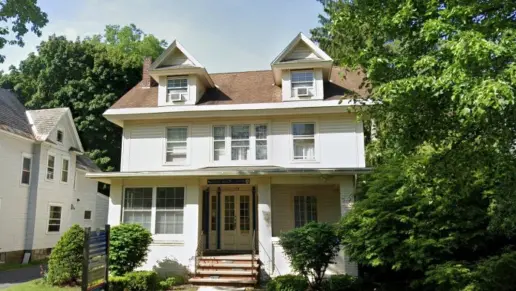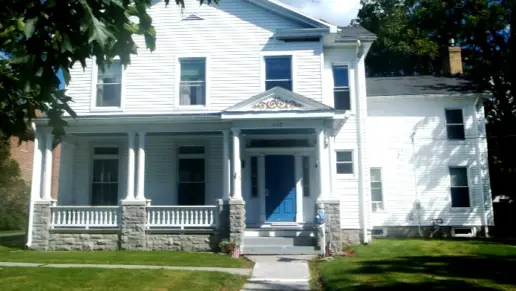The realization center healed my family I have three daughters, two were addicted to drugs and alcohol one had a food addiction as do I, we came a broken family to the realization center, my daughters were under 18,, the realization center and its incredible caring staff,wo ...
About Realization Center
The Manhattan Office of the Realization Center is located in New York, New York. They are a licensed New York outpatient facility. The organization is a member of the Addiction Treatment Providers Association, the New York Office of Alcoholism and Substance Abuse Services, as well as Recovery Health Solutions.
If you are an adult or you have an adolescent struggling with substance abuse, outpatient services are available. If you are HIV positive, you will still be able to receive treatment.
Medicaid and Medicare are accepted. If you don’t have insurance, you’ll be able to speak to their financial advisors in regards to the payment options they offer. They do accept credit cards.
Before you begin treatment, you will need to do an assessment. The assessment will help their team determine your needs, medical history and substance use history. After the assessment, your care team and you will discuss your treatment plan and develop your weekly schedule.
Their outpatient services include a partial hospitalization program (PHP) and an intensive outpatient program (IOP). Both programs offer individual and group therapy. The difference is the amount of time you will attend services each week.
During your individual counseling sessions, you will be able to have the support needed to reach your wellness and recovery goals. You will attend these sessions regularly.
I like that with group therapy you are going to feel validated that you are not on this journey alone. You will participate in group activities and discussions that help you and your peers resolve challenges together.
They’re also licensed to treat mental health issues with individuals who have a past history of substance abuse. The main criteria is that you are not in active addiction. They also provide integrated treatment for co-occurring disorders and they offer medication assisted treatment (MAT). This program can help reduce cravings and make withdrawal more comfortable to prevent relapses.
 Payment Options
Payment Options
Medicaid
Private insurance
Self-pay options
Sliding scale payment assistance
 Levels of Care
Levels of Care
 Outpatient
Outpatient
Outpatient Programs (OP) are for those seeking mental rehab or drug rehab, but who also stay at home every night. The main difference between outpatient treatment (OP) and intensive outpatient treatment (IOP) lies in the amount of hours the patient spends at the facility. Most of the time an outpatient program is designed for someone who has completed an inpatient stay and is looking to continue their growth in recovery. Outpatient is not meant to be the starting point, it is commonly referred to as aftercare.
 Medically Assisted Detox
Medically Assisted Detox
Drug and alcohol addiction often takes a heavy toll on one's body. Over time, a physical dependence can develop, meaning the body physiologically needs the substance to function. Detox is the process of removing drugs and/or alcohol from the body, a process that can be lethal if mismanaged. Medical detox is done by licensed medical professionals who monitor vital signs and keep you safe, healthy, and as comfortable as possible as you go through detox and withdrawal.
 Intensive Outpatient
Intensive Outpatient
Intensive Outpatient Programs (IOP) are for those who want or need a very structured treatment program but who also wish to live at home and continue with certain responsibilities (such as work or school). IOP substance abuse treatment programs vary in duration and intensity, and certain outpatient rehab centers will offer individualized treatment programs.
 12-Step
12-Step
Participants in 12 step programs maintain access to community-based peer support, which is the programs' primary treatment modality. 12 step recovery combines personal growth with paper coaching. Participants regularly attend group meetings, which are free, anonymous, open to the public, and available multiple times per day in most communities. They are also mentored by self-selected sponsors who guide them through the steps of recovery. Age and gender specific and other specialized formats are common.
 Programs
Programs
Teen Program
 Adult Program
Adult Program
 LGBTQ Program
LGBTQ Program
 Program For Men
Program For Men
 Program For Women
Program For Women
 Settings & Amenities
Settings & Amenities
-
Acupuncture Room
 Treatment
Treatment
 Alcoholism
Alcoholism
The goal of treatment for alcoholism is abstinence. Those with poor social support, poor motivation, or psychiatric disorders tend to relapse within a few years of treatment. For these people, success is measured by longer periods of abstinence, reduced use of alcohol, better health, and improved social functioning. Recovery and Maintenance are usually based on 12 step programs and AA meetings.
 Drug Addiction
Drug Addiction
When you choose drug rehab in New York, you'll participate in a variety of treatments that are designed to help you live a drug-free lifestyle. Common methods of treatment include group, individual, and family counseling, medication management, nutrition, exercise, and management of co-occurring mental health disorders.
 Dual Diagnosis
Dual Diagnosis
Many of those suffering from addiction also suffer from mental or emotional illnesses like schizophrenia, bipolar disorder, depression, or anxiety disorders. Rehab and other substance abuse facilities treating those with a dual diagnosis or co-occurring disorder administer psychiatric treatment to address the person's mental health issue in addition to drug and alcohol rehabilitation.
 Opioid Addiction
Opioid Addiction
Opioid rehabs specialize in supporting those recovering from opioid addiction. They treat those suffering from addiction to illegal opioids like heroin, as well as prescription drugs like oxycodone. These centers typically combine both physical as well as mental and emotional support to help stop addiction. Physical support often includes medical detox and subsequent medical support (including medication), and mental support includes in-depth therapy to address the underlying causes of addiction.
 Substance Abuse
Substance Abuse
Substance rehabs focus on helping individuals recover from substance abuse, including alcohol and drug addiction (both illegal and prescription drugs). They often include the opportunity to engage in both individual as well as group therapy.
 Clinical Services
Clinical Services
 Group Therapy
Group Therapy
Group therapy is any therapeutic work that happens in a group (not one-on-one). There are a number of different group therapy modalities, including support groups, experiential therapy, psycho-education, and more. Group therapy involves treatment as well as processing interaction between group members.
 Trauma Therapy
Trauma Therapy
Trauma therapy addresses traumatic incidents from a client's past that are likely affecting their present-day experience. Trauma is often one of the primary triggers and potential causes of addiction, and can stem from child sexual abuse, domestic violence, having a parent with a mental illness, losing one or both parents at a young age, teenage or adult sexual assault, or any number of other factors. The purpose of trauma therapy is to allow a patient to process trauma and move through and past it, with the help of trained and compassionate mental health professionals.
 Life Skills
Life Skills
Coping with day to day living is a challenge while in addiction recovery. Life skills training helps you learn how to manage daily tasks and deal with stress in healthy ways. This is key to long term recovery.
 Individual Therapy
Individual Therapy
Men and women in New York undergoing one on one individual therapy for drug and alcohol addiction treatment will address the unique psychological and emotional aspects that are often associated with addiction triggers. Your therapist helps you build a relapse prevention plan and set achievable goals to improve your mental health and achieve long term sobriety.
 Family Therapy
Family Therapy
Family therapy helps individual members of the family unit navigate the complexities of addiction. Therapists provide you with the tools you need to improve communication skills and conflict resolution. When families work together, they can support their loved one's recovery and help to restore balance and harmony within the household.

